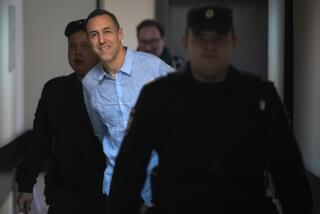To Defend the Earth, Defend Human Rights
- Share via
On Wednesday, prosecutors in Russia will try to reopen an espionage case against Russia’s most prominent environmental dissident, Alexander Nikitin. The bizarre grounds? That the government violated Nikitin’s civil rights the first time it tried to convict him.
Halfway around the world, in Mexico, no less absurd a dilemma faces Rodolfo Montiel, who organized fellow villagers in the southern state of Guerrero to nonviolently resist the clear-cutting of forests. The peasants formed human chains to block logging roads, angering local timber barons and attracting death threats. In May 1999, Montiel and a friend, Teodoro Cabrera, were captured at gunpoint by Mexican army soldiers and tortured for days into making phony confessions to drug and weapons violations. Last month, a federal court found the two men guilty and sentenced Montiel to six years and Cabrera to 10 years in jail.
Environmentalism can be dangerous. While activists in wealthy democratic nations like the U.S. pursue their causes from the comfort of their middle-class lives, their counterparts in less-fortunate countries pay a fearsome price for speaking out. But people like Nikitin and Montiel are defending the Earth we all share. We need them to succeed if we want to reverse deforestation, toxic contamination, global warming and other threats to our future. It is time, therefore, to expand our definition of environmentalism: Defending the Earth also means defending human rights.
Nikitin’s troubles with the authorities began in 1996, when he made world headlines by exposing what he called “a Chernobyl in slow motion”--the Russian navy’s reckless dumping of mothballed nuclear submarines in the Barents Sea and Kola Peninsula. A former submarine captain, Nikitin included only previously published information in his expose. Nevertheless, the Federal Security Service, Russia’s recast KGB, charged him with espionage--on the basis of a law written months after he was imprisoned.
Nikitin spent 10 months in jail and three years fighting his way through the court system. After 11 separate trials, Nikitin was acquitted of all charges last December by the City Court of St. Petersburg. The court criticized the Federal Security Service’s violations of Nikitin’s rights--the very finding prosecutors now shamelessly cite to justify a retrial, even though the Russian Supreme Court upheld the acquittal in April.
Nikitin was lucky in one respect: Besides courage and determination, he had friends outside Russia with the money, skill and dedication to help him. The Bellona Foundation, a group based in Norway that published his expose, organized an effective legal defense team and international publicity campaign. Vice President Al Gore and French President Jacques Chirac were just two of the world leaders who talked to former Russian President Boris N. Yeltsin about Nikitin.
“We made sure that whenever Russian officials and diplomats traveled abroad, they had Nikitin, so to speak, in their cocktail glasses,” Bellona’s Siri Engesaeth said. Engesaeth made this remark in July at a meeting of former winners of the Goldman Environmental Prize, at which Nikitin, who won the prize in 1997 but had been prohibited from leaving Russia to accept it, was the guest of honor. Montiel won the Goldman prize this spring but was only allowed to receive it in prison. To free him, Engesaeth said, outsiders will have to mount a campaign similar to that for Nikitin.
That campaign is now underway, buoyed by a new alliance between the Sierra Club and Amnesty International--evidence that environmental and human rights leaders at last recognize a need to collaborate. Montiel’s case has received media attention, and dozens of members of Congress have written to Mexican President Ernesto Zedillo urging his immediate release. Zedillo made no reply, but his successor, President-elect Vicente Fox, requested a meeting with Sierra Club, Amnesty International and Goldman officials when he visited Washington in August. Meanwhile, however, Montiel was convicted.
Clearly it will take added pressure to win justice for Montiel, just as Nikitin still needs support as he faces the Russian Supreme Court on Wednesday. In a Sept. 5 interview in New York, former Soviet leader Mikhail Gorbachev told me, “Some of the Russian institutions are going overboard on this issue, and we must help put an end to this prosecution.”
Russia and Mexico have each spent 70 years under the thumb of one-party domination; the rule of law remains weak in both nations. But even authoritarian states are susceptible to outside pressure--if outsiders care enough to exert it.
More to Read
Sign up for Essential California
The most important California stories and recommendations in your inbox every morning.
You may occasionally receive promotional content from the Los Angeles Times.













